- Home
- Loki Renard
The Lord's Bride
The Lord's Bride Read online
The Lord’s Bride
By
Loki Renard
Copyright © 2014 by Stormy Night Publications and Loki Renard
Copyright © 2014 by Stormy Night Publications and Loki Renard
All rights reserved. No part of this book may be reproduced or transmitted in any form or by any means, electronic or mechanical, including photocopying, recording, or by any information storage and retrieval system, without permission in writing from the publisher.
Published by Stormy Night Publications and Design, LLC.
www.StormyNightPublications.com
Renard, Loki
The Lord’s Bride
Cover Design by Korey Mae Johnson
Images by Period Images and Bigstock/Possum1961
This book is intended for adults only. Spanking and other sexual activities represented in this book are fantasies only, intended for adults.
Chapter One
On a cool spring evening, a young lady in a silken gown crept out onto a fire-lit balcony. Her eyes were the color of damp grass, her hair the hue of bracken. Delicate features sat in a neat face still slightly rounded with the bloom of youth. Her neck and wrists were festooned with gold and jewels, but they were not the main signifiers of her nobility. Royal blood flowed in Mary de Vere’s veins, evident in her dignified posture and effortless grace in even the smallest and most common motions. As she leaned her weary body against a pillar, the curve of her hip described an elegant sway. Her eyelashes drooped low, for exhaustion was creeping upon her. The spring celebrations were still carrying on in the hall below, lords and ladies and their offspring making merry.
Mary was not inclined toward such occasions. She found polite conversation tiresome and the frequent suggestions of impending matrimony even more so. It would not be her choice who she married, but all of Staffordshire knew that Lord de Vere was a doting father, unlikely to give his daughter into marriage lightly. There were several suitors courting her, though she doubted any did so for love.
A slight sound in the shadows confirmed her suspicion that she had not escaped the gathering unnoticed.
“Mary…” her name was growled softly in a familiar masculine timbre.
She answered without turning her head away from the starlit night. “Martin.”
“You look more beautiful than ever, Mary. There is not a lady who can compare.”
Martin de Stafford, heir to Stafford manor, stepped forward and fixed his eyes upon her. He was a handsome man, as most young men of strength and means were. From a distance, there was no difference between Martin de Stafford and the many other young bucks attending the spring gathering. His station perhaps made him more interesting to some mothers of prospective brides, for he bore the name of the shire. It was his family who owned the largest manor and the greatest holdings. But Mary was not impressed, for she too came from a powerful, though dwindling, family. The de Veres owned much of the shire; indeed much of what the de Staffords did not own was in the possession of the de Vere family. Hundreds of peasants lived on their lands and survived by tilling their fertile soils.
Dark of hair and of eye, Martin de Stafford was possessed of some rakish charm, though it tended toward the reserved and serious. He did not dance as many of the other young men did, nor did he laugh and curse at the antics of the jesters and the players.
Many thought him dour, perhaps even simple, but Mary knew better. He had been five years old when she was born, and their late mothers had been the very best of friends. For many, many years, Mary had followed the older Martin about their respective manors and surrounding lands with a great fondness. For his part, he had tolerated her as a gentleman should. Though he had not always been pleased by her presence, he had gone out of his way to ensure her safety. Martin seemed to know her wicked thoughts before she had them; indeed, their long association had led to a certain intuition for one another’s actions.
In early adulthood, they were still very much good friends, but Mary’s feelings had undergone a certain change. When she looked at the hard—some might say foreboding—lines of Martin de Stafford’s face, something in his gaze made her heart leap and her pulse race. Promises of forbidden pleasures danced in pupils made wide by the firelight.
“I thought I might be alone for a time,” she said, turning from him to gaze out from the balcony over the darkened, silver-spun land lit by the moon. A breeze caught the loose strands of her hair and made them billow like a banner. There was something in the air that evening, something Mary could not comprehend but could sense. It made her ill at ease.
“I can leave, if you like.”
“No,” she said softly. “Stay.”
Martin walked beside her and put his hand over hers. The touch of his skin was warm, comforting. She felt some of her anxiety abate.
“The world is changing, Martin.”
“The world is not changing. We are. Soon you will be married and I will be married, and we will have families of our own.”
“Yes,” she said softly. Soon he would be married to a second cousin from Cheshire. The marriage had been arranged when he was but four years of age. Now that he was three and twenty, it would take place in the coming year.
As a child, Mary had once wished that she and Martin could marry one another, but Martin had never spoken of such sentiments, and as time passed, she had stopped her innocent declarations of love. Now there was only the silence between them to be shared, the touch that soothed but could not satisfy.
“Soon you will be married and have a brood. Soon you will have a potbelly and a thick beard, with meat stuffed into graying pelt, and soon you will have gout in your big toe.” She laughed with merriment at her own jests.
Martin’s lips twisted slightly. “Your imagination will get you into trouble, sweet Mary.”
“Will it? I think not.” She turned her back to the balcony and looked sidelong at him. “Will you wear double breeches to stop the sagging of your manhood?”
“Mary!” Martin snapped her name. He had always been given to censure, and she to teasing.
She did not feel tired any longer. Instead, she felt quite wide awake, glee flashing through her blood as Martin’s dark eyes flashed warning. “You say my name so sweetly,” she laughed.
“I will thrash you just as sweetly if you insist upon this rudeness,” he said, glowering in a way that would have made a less familiar companion wither.
Mary leaned over and placed a chaste kiss on the tip of his nose. “You will never thrash me.”
“Perhaps I will not thrash you,” he admitted. “But I will not hesitate to bare your hindquarters, m’lady, and spank them until they burn brighter than these torches.”
“All for a little jest?” Mary feigned shock. “My, what a brute you have become, Martin.”
“I know you well enough, Mary. I know that after your innocent jests come actions not nearly so innocent.”
“And what trouble could I possibly find on this balcony?” She gave him an arch look, her green eyes sparkling with daring.
“Mary, you could find trouble in a sack,” he said. “You may fool your father and those about you, but I know you for what you truly are, a wicked miscreant who all too often escapes folly without the punishment she so deserves.”
He spoke quite sternly, though not without affection. It was not the first time Mary had heard such sentiments from him, but as he had never acted upon the words, they did not unduly concern her.
She laughed again. “You had best be careful, Martin. Your scowling will create so many wrinkles your bride will think she is to marry an old man and refuse you on the wedding night.”
“As I understand it, my bride is most eager in that regard,” Martin replied, seemingly unthinking.
&nb
sp; Jealousy welled in Mary. It was not that she wished to marry Martin, at least not that she could admit to herself. But thinking of another woman in his bed, under him, bearing his children, plagued her mind most horribly.
“I am sure she is eager. Eager with the squires and the stablemen, and no doubt the mail couriers, and—”
“Mary! I will not hear another foul word out of you. It is not becoming, nor is it respectful. You are speaking of the future Lady de Stafford.”
“Lay de Stafford, mayhap.”
“You test me, Mary.”
Mary froze as he reached for her wrist and wrapped his large hand about it. He pulled, and she found herself pressed against his body, so close that their lips almost touched.
“If you test me further, I will not hesitate to lift your skirts and do as I have promised.”
“Test you, as half of Cheshire has tested your bride?”
There was no further discussion. Martin held her firmly, reached down, swept up her skirts, and tucked them into the hand that held her. She was all but bared there in the moonlight, her drawers offering little coverage, for the ties had worked their way loose during the dances and now sagged open, displaying the pale curve of her virginal cheeks.
Red bloomed across her bottom as Martin de Stafford made good on his promise. He clapped his hand hard against Mary’s buttock, thrusting her against his body. She cried out, but he ignored the sound and laid another, then another blow, until she was dancing yet again, this time against his masculine frame.
“Stop!” she beseeched him. “I pray, please, stop!”
“I will stop when you apologize for your foul and unladylike language,” he said. “Not to mention the aspersions you have so carelessly cast upon my bride to be. You have not so much as met her.”
“I don’t need to, the troubadours all took a turn… Ow! Martin!”
He spanked her more firmly, sweeping up both side of her skirt and pushing her undergarments fully aside so the fine white linen framed her ever reddening bottom.
“Your cheeks shall pay for your cheek,” he said, grim voice loud over slaps and protestations.
“This is most immodest!”
“As was your speech.”
“I shall tell my father. He will have you horsewhipped!”
“He will do no such thing,” Martin replied as his hand struck the center of her quivering bottom. “And nor will you, I’ll warrant. He would be most disappointed by your comportment. I know I am.”
The four little words were like a dagger in Mary’s breast. In that instant, she knew that he did not understand her jealousy. He thought she was being crass for the sake of being shocking. He was punishing her as he might a younger sibling.
Tears sprang to her eyes, not as a result of the sting in her hide, which was not inconsiderate, but as a result of the rejection she felt.
He saw her tears, mistook them for contrition, and stopped. “Have you learned your lesson?”
“I have,” she said. She had learned her lesson—the lesson being that Martin de Stafford, for all his compliments and kindness, would never see her as anything other than the snotty-nosed whelp who had once followed him hither and thither.
“I am glad to hear it.” Letting her skirts fall, he placed a chaste kiss on her cheek. “Do not look so sad. It was not so painful. I have seen you endure much worse without complaint.”
He referred to scrapes and bruises, not spankings and heart wounds. The former were much more easily borne than the latter.
“I am weakening in my advanced years,” she said by way of explanation.
“That I doubt,” he said, unhanding her wrist.
She missed his grip almost immediately. A wistful gaze passed from her to him, even as her bottom stung with the outrage he had inflicted upon her. There were very few men Mary would ever have accepted such treatment from, but Martin was foremost among them.
How perverse, to watch him prepare to take a wife. A lifelong association was certain to be broken when he made his family and she hers. Many words clustered upon Mary’s tongue, confessions of love, statements of desire. But they all stayed mute, for what was the point of speaking when her words would do nothing?
“It is not like you to be melancholy,” Martin observed. “Nor is it in your nature to hide away from the fun. Will you not tell me what weighs so heavily on your heart?”
“I cannot tell you,” she said. “I cannot tell you, for nothing can be done about it. Things are as they are, and all the wishing in the world will not change them. We are not people. We are pawns, moved about the board of life by those who bore us.”
“Has your father displeased you in some way?”
“No. My father has given me every advantage and every freedom, but it will all amount to naught. Soon I will marry some poor soul and make his life a misery.”
Martin’s bright laugh broke the night. “A truer word was never spoken,” he said. “I only hope you marry a man equal to you, sweet Mary.”
Biting her tongue, Mary pretended at a smile. There was but one man equal to her. He stood before her, utterly indifferent.
As words faded into silence, the young friends looked upon one another. No more would they ride out with their peers, many of whom were already married and producing heirs. No more would they find innocent amusement on the river of a summer’s afternoon. The mantle of noble duty was a heavy one, and they could put it off no longer.
“Mary…”
Mary never learned what Martin was about to say, for a piercing scream from the party below broke through their conversation. It was followed by a cacophonous shouting and more shrieks—horrible, bloodcurdling sounds.
Martin turned toward the noise, shoulders squared. “Stay here, Mary,” he said. “Something ill is afoot.”
He rushed toward the stairs leading down to the main hall. Mary followed immediately behind him. She had no intention of staying alone on the balcony whilst people below yelled bloody murder.
When she arrived below, she discovered that the minstrels had stopped playing and were looking toward the center of the hall with pale faces. A cluster of nobles made it impossible for Mary to see what had happened, but it seemed obvious that some attack had taken place, for a man dressed in the black robes of a monk was being hauled toward the back of the hall by three stalwart men. In his hand a long silver dagger was dripping blood, the essence of some poor soul.
An assassin. An assassin at the house of de Vere. Cold fingers clutched at Mary’s heart.
The throng parted for a moment, and Mary saw red velvet shoes. Red shoes trimmed with gold. One was being worn, the other lying on the floor beside an unshod foot. Mary recognized the shoes, for she herself had embroidered them as a gift for her father’s birthday.
“Father?” She did not scream the word, but her filial whisper parted the crowed as well as any horn.
There upon the floor was her father. His face was pale, eyes staring and devoid of life. Darkness from the depths of the pit of hell rose and claimed Mary. She dropped in a faint.
* * *
In the black days that followed, Mary’s estranged uncle took over the estate. Her father’s murder remained something of a mystery, one that was ill-investigated. The man who had committed the horrible act was put to death before making a full confession, so his motives never came to light. There were suspicions, however, that he had not killed the late Richard de Vere for reasons of his own, rather that he may have been paid to do so. Though he was dressed as a monk, he had belonged to no order. Indeed, his real name was unknown.
The misery of the entire affair made Mary numb to much of what went on in the weeks following his passing. Her uncle, Vincent de Vere, was a petty merchant with none of her father’s sensitivities, especially regarding marriage. Within weeks of Lord de Vere’s passing, he informed Mary that her wedding would take place—to a man who was not a noble but whose family ran a large fishing enterprise in the North Sea.
“But, Uncle,” Mary
protested over the kippers she had been eating, “I do not wish to marry this Jonathan Roth. I do not know him, and I certainly do not love him. Father would not—”
“It matters not what your father would have decided,” Vincent interjected snappishly. “He has passed, Mary. I am lord of these lands now, and of you.”
Black hate welled in Mary, a thick, cloying feeling that left no room for anything else. She would have liked to have flown at the horrid man who taunted her with echoes of her father’s visage in his own miserly face, but it would have been for naught. Unlike Mary’s father, who never so much as raised a hand to his child, Vincent believed in beatings. He had whipped half the staff out of employment in his first week, and though Mary had thus far avoided the taste of his lash, she was under no illusion that she was immune.
“Please, Uncle Vincent. He is forty years my senior.”
“You will do well with an older man,” Vincent snorted, rifling through a chest containing jewels which had once belonged to Mary’s late mother and now belonged to him.
His fingers, oiled with fish breakfast, smeared and stained the gold, silver, and opals in a way that made Mary tremble with rage. Mother had kept those pieces in pristine condition all her life and now they, like everything else in the de Vere manor, were being besmirched by the interloper.
“Besides,” he said, wiping his dripping nose on his sleeve. “You are practically a spinster yourself.”
“I am not a spinster!”
Vincent looked up from his treasures, a vicious look upon his face. “You are fortunate that you are to be married soon and cannot go to the altar marked and bruised, or else I would beat you most severely.”
It was quite apparent to Mary that she, like the jewels, was a commodity to be traded away. Vincent had not so much as bothered to look for the highest bidder, or a suitable husband. He had simply chosen one of his trading partners and foisted her upon him. Up until that moment, Mary had not known how much capacity for hate she had. She hated Vincent with all the strength in her body and her mind and her soul.

 Stealing Candi
Stealing Candi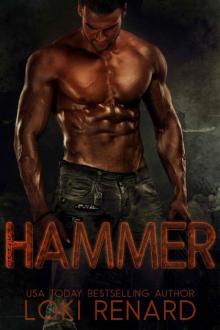 Hammer: A Dark Romance
Hammer: A Dark Romance FREAK: A Dark Medical Romance
FREAK: A Dark Medical Romance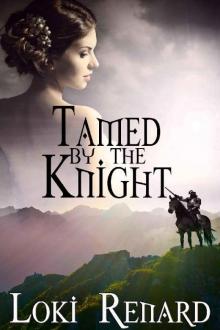 Tamed by the Knight
Tamed by the Knight Cuffs
Cuffs The Ranger and the Runaway
The Ranger and the Runaway Scratch (Feral Aliens)
Scratch (Feral Aliens)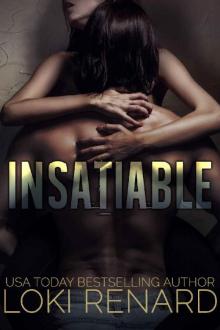 Insatiable: A Dark Romance
Insatiable: A Dark Romance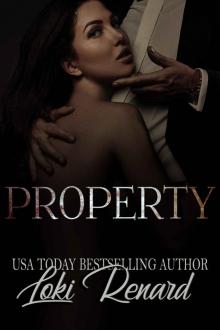 Property: A Dark Billionaire Romance
Property: A Dark Billionaire Romance Hard Time
Hard Time Angelo: Making A Monster (House of Vitali Book 1)
Angelo: Making A Monster (House of Vitali Book 1)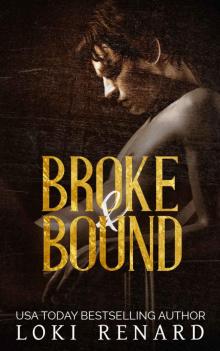 Bound and Broken: Dark M/M Box Set
Bound and Broken: Dark M/M Box Set His Pet Princess
His Pet Princess Instinct: A Dark Sci-Fi Romance
Instinct: A Dark Sci-Fi Romance Broken Boy: A Dark Gay Menage Romance
Broken Boy: A Dark Gay Menage Romance Vicious Revenge (Vicious City Book 4)
Vicious Revenge (Vicious City Book 4)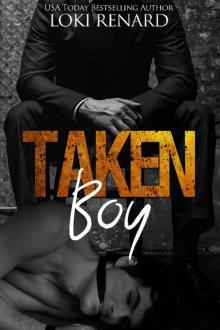 Taken Boy
Taken Boy The Alien King's Prey: A Dark Alien Romance (Royal Aliens)
The Alien King's Prey: A Dark Alien Romance (Royal Aliens) The Lord's Bride
The Lord's Bride Taken by the Alphas
Taken by the Alphas Human Pet Pound (Possessive Aliens)
Human Pet Pound (Possessive Aliens)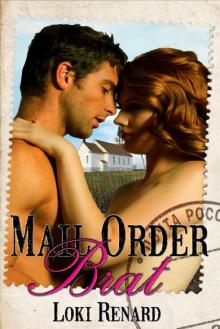 Mail Order Brat
Mail Order Brat Karen vs Alien
Karen vs Alien The Bad God Wins: A Dark Romance (Possessive Gods Book 2)
The Bad God Wins: A Dark Romance (Possessive Gods Book 2) Possessive Aliens: Dark Scifi Romance Box Set
Possessive Aliens: Dark Scifi Romance Box Set Savage's Woman
Savage's Woman Savages: A Reverse Harem Romance
Savages: A Reverse Harem Romance The Doctor's Captive
The Doctor's Captive Captive: A Dark Cyborg Romance
Captive: A Dark Cyborg Romance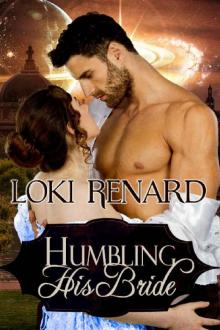 Humbling His Bride
Humbling His Bride The Alpha's Captive
The Alpha's Captive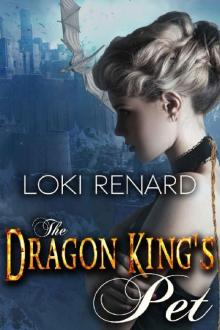 The Dragon King's Pet (Dragon Brides Book 3)
The Dragon King's Pet (Dragon Brides Book 3) Rock the Bodyguard
Rock the Bodyguard The Marine's Pet
The Marine's Pet Kitty vs Alien (Feral Aliens)
Kitty vs Alien (Feral Aliens)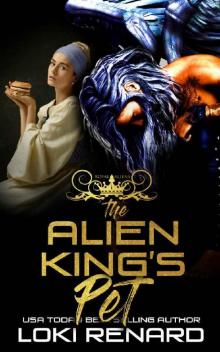 The Alien King's Pet: An Alien Abduction Romance (Royal Aliens)
The Alien King's Pet: An Alien Abduction Romance (Royal Aliens) Brutally Broken: A Dark Mafia Romance
Brutally Broken: A Dark Mafia Romance The Doctor's Pet
The Doctor's Pet Virgin City (The Lesbia Chronicles)
Virgin City (The Lesbia Chronicles) Tex's Revenge: Military Discipline, Book Two
Tex's Revenge: Military Discipline, Book Two The Dragon's Pet
The Dragon's Pet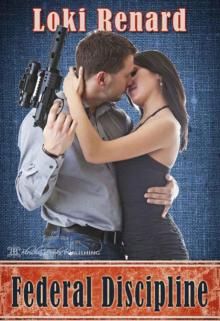 Federal Discipline
Federal Discipline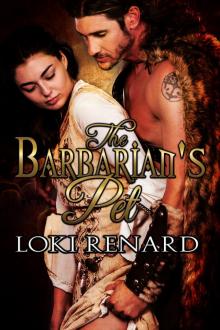 The Barbarian's Pet
The Barbarian's Pet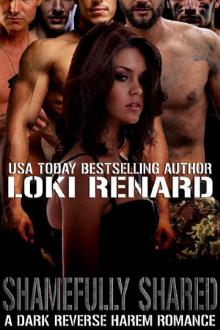 Shamefully Shared
Shamefully Shared A Wilder Heart
A Wilder Heart Perfect Evil: A Dark Gay Romance
Perfect Evil: A Dark Gay Romance SCAR_A Dark Military Romance
SCAR_A Dark Military Romance The Warlord's Pet
The Warlord's Pet The Hunter's Pet
The Hunter's Pet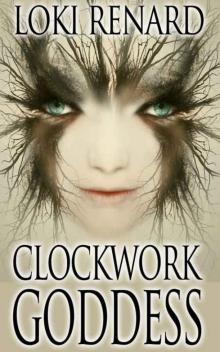 Clockwork Goddess (The Lesbia Chronicles)
Clockwork Goddess (The Lesbia Chronicles) Masters of Eden
Masters of Eden Leashed by the Dragons
Leashed by the Dragons Brute: A Dark Sci-Fi Romance
Brute: A Dark Sci-Fi Romance Cry Assassin
Cry Assassin The Doctor's Command
The Doctor's Command The Dragon Lord's Pet
The Dragon Lord's Pet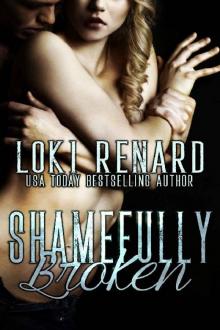 Shamefully Broken: A Dark Romance
Shamefully Broken: A Dark Romance Daddy's Whip
Daddy's Whip Corrective Treatment
Corrective Treatment Bought: A Dark Billionaire Romance
Bought: A Dark Billionaire Romance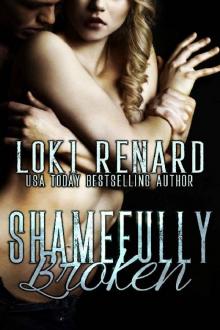 Shamefully Broken
Shamefully Broken The Firefighter's Woman
The Firefighter's Woman Perfect Evil
Perfect Evil Witch's Cat
Witch's Cat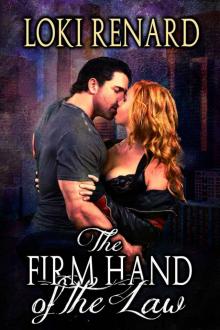 The Firm Hand of the Law
The Firm Hand of the Law The Billionaire's Pet
The Billionaire's Pet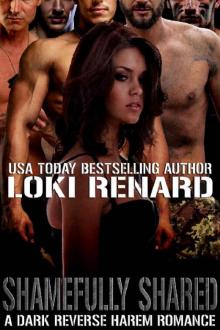 Shamefully Shared: A Dark Reverse Harem Romance
Shamefully Shared: A Dark Reverse Harem Romance A Short Leash
A Short Leash Broken by the Alien: A Dark Sci-Fi Romance
Broken by the Alien: A Dark Sci-Fi Romance The Alien's Leash
The Alien's Leash The Alien's Pet
The Alien's Pet The Ward of Falkroy
The Ward of Falkroy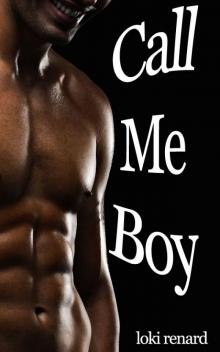 Call Me Boy
Call Me Boy Savages Recruit
Savages Recruit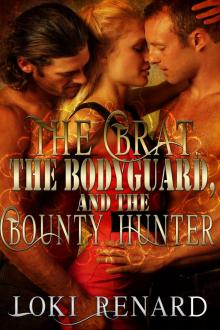 The Brat, the Bodyguard, and the Bounty Hunter
The Brat, the Bodyguard, and the Bounty Hunter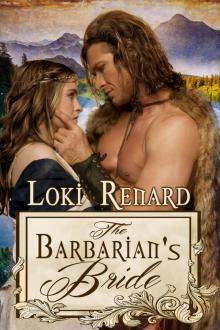 The Barbarian's Bride
The Barbarian's Bride